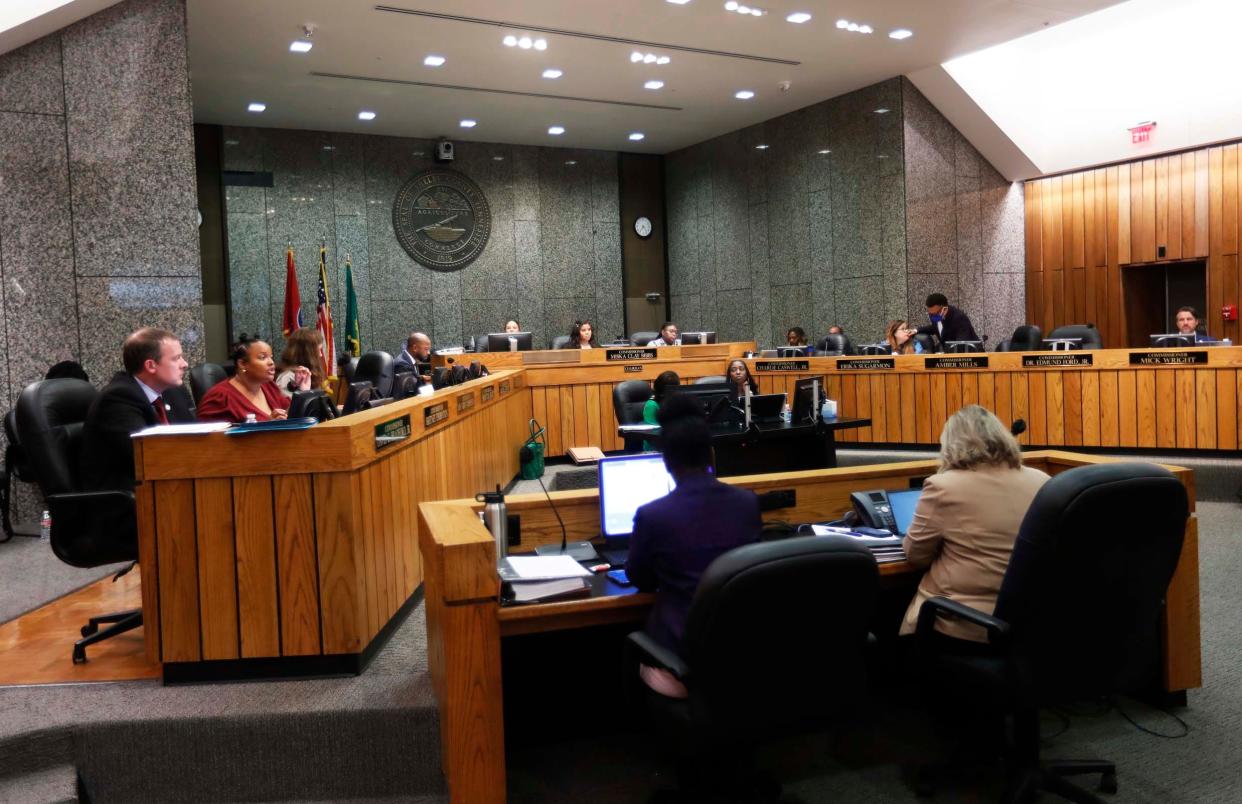Is Shelby County getting a jail mental health facility? Here's why it may be closer

Last year, the Shelby County Board of Commissioners gave the OK for initial funding for a jail mental health facility, now the plan is shaping up even more. An item presented to commissioners at a committee meeting Wednesday, with vast support from both elected officials and jail officials, outlined how the construction of the facility would be funded.
The resolution is looking for approval of $18 million in American Rescue Plan Act funds previously earmarked for revenue loss. The project will also use the $2.5 million in ARPA funds that were allocated for surveying the facility, with an estimated total cost of $21 million.
Previously, estimates for the facility were over $25 million and would have been funded through capital improvement project funds and take multiple fiscal years to fund.
The county will adopt a new approach to constructing the facility, using a construction contract management system called "Construction Manager at Risk." According to the Federal Emergency Management Agency, a CMR is a delivery method of a project where a construction manager is brought on early in the design process. The construction manager works with designers, who are typically hired out separately, and works from the early planning stages.
Cliff Norville, Director of Public Works, during committee meetings that the county has never used the CMR process.
"I do know that I have some counterparts of the city and the school board and the state which have used this and so we'll be looking to follow their example throughout the process," Norville said.
Shelby County news: What led to Shelby County Clerk Wanda Halbert investigation and where are things now?
All ARPA funds must be allocated by Dec. 31, and spent by Dec. 31, 2026. If the county government does not spend all the ARPA dollars, it has to be returned back.
ARPA was given to localities and state governments in response to the Covid-19 pandemic, to jumpstart a post-pandemic economy.
"The $18.8 million appropriated through this resolution are dollars previously budgeted to replenish lost revenue by March of this year. According to the Financial experts, Shelby County's revenues appear to be within budget and that that opens (ARPA Funds) up for this project by taking the funding approach outlined in the resolution," Frankie Dakin, Shelby County Mayor Lee Harris' deputy chief of staff said during committee meetings.
Also added to the cost is $250,000 to initiate the study of a new jail facility for Shelby County, something many local stakeholders have called for.
What is the "Memphis Model,"?
The term "Memphis Model" stems from a similar facility and program in Nashville, called the "Nashville Model." The Davidson County Residential Drug Court and Davidson County Behavioral Care Center opened its doors in 2020 in an effort to “decriminalize” mental health "upon arrival" at the Nashville Downtown Detention Center.

The new space for the Memphis facility is on county-owned land, another cost-saving measure taken to reduce the overall spending on the project. The facility in Memphis will be located near the corrections buildings, according to Dankin.
The model Nashville has adopted will also be used and adapted to the needs of Shelby County, according to a document provided to The Commercial Appeal.
In Nashville, individuals exhibiting signs of mental illness upon booking see a mental health clinician who then can refer them to the Davidson County BCC.
The Davidson County District Attorney, police department personnel and mental health professionals meet regularly to discuss if an individual meets the requirements to be admitted to the program instead of spending time in jail.
More county news: Shelby County land bank reform measures to have final vote during April meeting
During a detainees stay, they receive both individual and group therapy, medication management and community programming.
Individuals who receive treatment at the Davidson County BCC receive post-treatment plans that are made upon release. Patients receive 30 days of medicine, TennCare application support and connection to other community supports.
Upon successful completion of the program in Nashville, charges are dismissed for detainees.
Data from the BCC’s first two years returned a 29% recidivism rate, which is 17% lower than the Tennessee average of 46%. The reduction in recidivism is something stakeholders in Shelby County hope to see in the county.
Bipartisan, local stakeholder support
The resolution has resounding support from commissioners, with eight commissioners co-sponsoring the resolution. During committee meetings, despite lengthy questioning among Commissioners, Commissioner Henri Brooks signed on as a ninth co-sponsor.
In October, Commissioner Erika Sugarmon led a group of commissioners, judges and jail staff to Nashville to tour the BCC.

Commissioners are not the only ones in support of the new facility. Multiple letters of support for the facility have been penned to Commissioners. The support draws from multiple promises the Memphis Model hopes to make regarding recidivism and lessening the load on the current jail.
"The proposed facility can help stabilize our community, improve public safety, and, ultimately, save taxpayer dollars through reduced recidivism," Shelby County Sheriff Floyd Bonner wrote.
Bonner is not alone in letters of support for the resolution. District Attorney Steve Mulroy, CEO of Alliances Healthcare Services Laurie Powell and Paul Wesolowski, University Tennessee Health Science Center Vice Chancellor for Strategic Partnerships, also submitted letters.
The final vote on the facility's funding is planned for April 9.
Lucas Finton contributed to this report.
Brooke Muckerman covers Shelby County Government for The Commercial Appeal. She can be reached at (901) 484-6225, [email protected] and followed on X, formerly known as Twitter @BrookeMuckerman.
This article originally appeared on Memphis Commercial Appeal: Memphis jail mental health facility could be modeled off Nashville's
